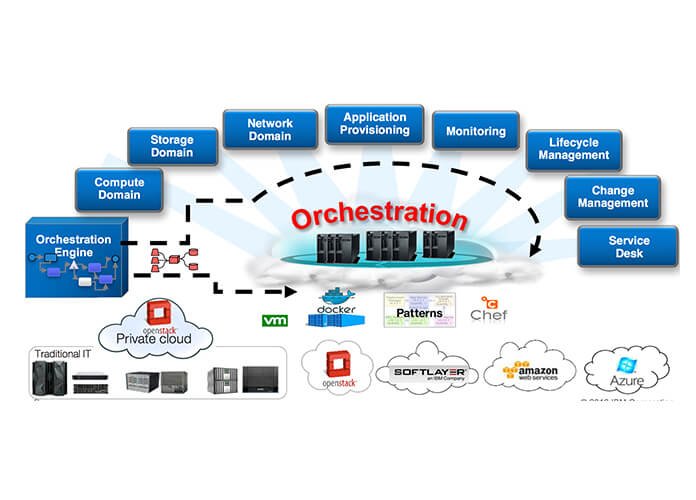Understanding cloud orchestration

Cloud orchestration means using a programming technology to manage the interactions and connections amongst the workloads on both private and public cloud platforms. Cloud orchestration is used to start servers, manage networking, assign storage capacity, and also in gaining access to specific software on cloud services. It connects tasks into a cohesive flow to accomplish any objectives with permission oversight. Cloud orchestration accomplishes these tasks through its three primary attributes: resource, workload and service orchestration. Orchestration technology must be compatible with various systems in different geographical locations with different providers. The orchestration platform integrates permission checks for securities and compliance.
How cloud orchestration is different from cloud automation.
People think that automation and orchestration are the same things, but there is a little more complexity in orchestration. In automation, the usual focus is on a single task, whereas in orchestration it includes an end to end process. Orchestration includes managing related services, checking high availability, failure recovery, scaling and much more. Automation is usually used in the context of specific tasks, but orchestration includes automation of workflows and processes.
Benefits of cloud orchestration.
- Initiates best practices – the essential need for cloud orchestration is to clean up the running processes so that they stick to best practices and smooth workflow. Automation works better when processes are adequately organized. Many organizations structure their platforms based on practices that include pre-built deployment templates, structured IP addressing and security.
- Simplifies optimization – the primary difference between automation and orchestration of systems is the difference in cloud tasks and workflows. While automation addresses individual tasks, orchestration wraps tasks into optimized workflows. An orchestrated deployment of an application includes automated tasking of multiple servers, databases, networking and storage.
- Unifies automation – many cloud administrators automate at least a portion of their processes. It creates an issue when there is no record or arranged storage of the automated scripts. Orchestration helps in centralizing automation processes in a single storage space. It helps enterprises in expanding their automated services at a lower cost and faster rate.
- Improves control – if unchecked the virtualization sprawl spirals out of control. It causes wastage of money, resources and complicates the cloud platform. Cloud orchestration provides numerous tools to monitor, modify the virtualization sprawls automatically. Thus, reducing the time and effort required to manage the cloud.
- Self-service portal – Self-service portals are the need of the hour for both infrastructure developers and administrators. These portals provide developers the freedom to select the cloud services they need. It also eliminates the need to include infrastructure administrators in the process of deployment.
- Automates calculations – keeping track of the cloud resources used is essential for organizations. While selecting a self-service portal chargeback and metering tools help in checking the number of resources used.
- Cost saving in the long term – one of the significant advantages of cloud orchestration is that it saves cost in the long term. The orchestration tools not only help in improving cloud services but also reduce the excess staffing by automation and self-service processes.
- Facilitates business agility – the business market is taking a significant turn towards complete digitalization. IT developers must design and manage their resources so that they can create new opportunities for growth. Implementing cloud orchestration is one of the foremost and easy ways to be agile.
Some cloud orchestration tools
- Chef – Chef is an automation platform that converts infrastructures into codes. It automates the designing, configuration, management and deployment of applications along with various networks.
- Puppet – The workings of the puppet platform is similar to that of Chef. Puppet provides features such as easy problem reporting and also helps in faster deployment of applications.
- Heat – it provides a template-based orchestration that describes any application by the execution of API calls that generate cloud applications. This software integrates all core components in a single template file. The templates allow the creation of functionalities like high availability, nested stacks and instant autoscaling.
- Juju – Juju is an automated orchestration service management tool that enables developers in deploying, managing and scaling services and software on a variety of cloud servers. It significantly reduces the workload for configuration and deployment of product’s services.
- Docker – it is an open platform for designing, shipping, running and delivering applications swiftly. Docker helps in testing, shipping and deploying the code faster to the market reducing the time taken between development and running of code.
Cloud orchestration platforms help in easy and quick configuration, provision, deployment, and development of an application. Orchestration also enables enterprises in making their products available to a variety of cloud environments. Thus, increasing the exposure of the product to a broader audience and expansion of revenue opportunities for the company.